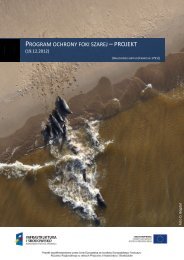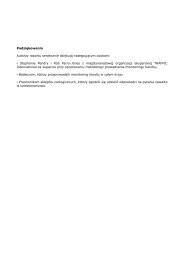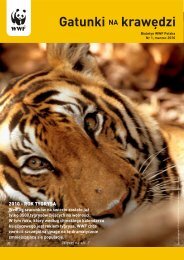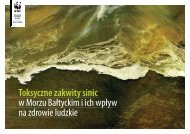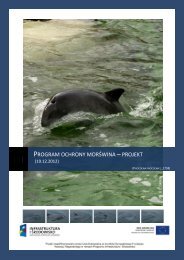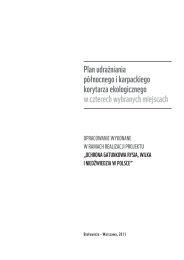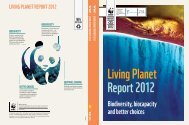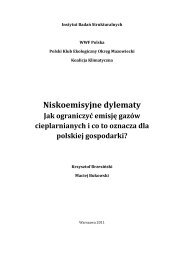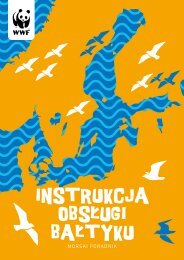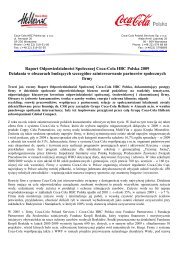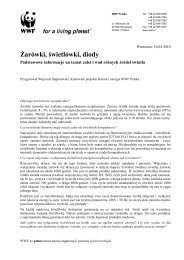COLLECTING GHOST NETS IN THE BALTIC SEA - WWF
COLLECTING GHOST NETS IN THE BALTIC SEA - WWF
COLLECTING GHOST NETS IN THE BALTIC SEA - WWF
You also want an ePaper? Increase the reach of your titles
YUMPU automatically turns print PDFs into web optimized ePapers that Google loves.
The poorly designed organisational and legal<br />
system, where previously introduced excise duty<br />
exemptions were reduced with no possibility of taking<br />
advantage of the provisions of the Act on the<br />
Product fee and deposit fee, eliminated the grassroots<br />
initiative of recycling waste polyolefins<br />
(OPOs) enabling the production of high quality liquid<br />
fuels. On the one hand, the 3×20% programme<br />
has been implemented (20% savings in the consumption<br />
of energy, reduction in greenhouse gas<br />
emissions, including CO 2<br />
, and increase in the use<br />
of renewable sources of energy, biomass and<br />
biogas) and new clean carbon technologies have<br />
been developed, but on the other hand unwise<br />
decisions have led to the bankruptcies of companies<br />
engaged in advanced chemical recycling for<br />
the production of fuels.<br />
That is why it is worth analysing and considering<br />
other technologies which may be used to revive the<br />
grass-roots initiative that emerged in Poland in<br />
© Lithuanian Fund for Nature<br />
2002–2006 with regard to the production of fuel by<br />
recycling waste polyolefins. One of the most interesting<br />
options is pyrolysis.<br />
In search of the possibilities of disposal of ghost<br />
nets for the purpose of this project, the Department<br />
of Polymers at the Faculty of Chemical Engineering<br />
of the West Pomeranian University of Technology<br />
in Szczecin was contacted, as well as several<br />
establishments engaged in waste disposal in<br />
Poland (e.g. EkoVita in Brzeg Dolny, Eko-Green in<br />
Poznań and PMS Bartnicki in Warsaw). The most<br />
promising was the contact with “Dagas” from<br />
Warka, owner of a plant for pyrolysis of rubber and<br />
polymer waste, which agreed to take a batch of<br />
ghost nets for trial processing. A 35 kg batch of nets<br />
retrieved from the sea by the Border Guard was<br />
collected from the Port Master’s Office in Dziwnów<br />
and delivered to the Warka plant in early February<br />
of this year. Due to low temperatures, the pyrolysis<br />
plant was shut down temporarily, but it was agreed<br />
that, after the commencement of its operation,<br />
<strong>WWF</strong> Poland would receive a report with results of<br />
the experiment. Since “Dagas” activities include<br />
design and manufacture of pyrolysis plants, it would<br />
be advisable and desirable to install such plants in<br />
selected fishing ports. The operation of the pyrolysis<br />
plant owned by “Dagas” is described at: http://<br />
prima-warka.home.pl/fum/Pyrolysis.pdf.<br />
it would be advisable and<br />
desirable to install such plants<br />
in selected fishing ports<br />
Material recycling<br />
Material (mechanical) recycling involves the treatment<br />
and processing of polymer waste to obtain<br />
new products. To ensure good results of the process,<br />
it is necessary to use clean, homogeneous<br />
polymer material waste. Therefore, this method is<br />
unsuitable for recycling retrieved ghost nets, which<br />
usually contain organic impurities in the form of<br />
remains of organisms attached to the nets; moreover,<br />
the nets are not homogeneous (they contain<br />
a combination of different materials, fibre and steel<br />
ropes and metal parts).<br />
30 <strong>COLLECT<strong>IN</strong>G</strong> <strong>GHOST</strong> <strong>NETS</strong> <strong>IN</strong> <strong>THE</strong> <strong>BALTIC</strong> <strong>SEA</strong>



